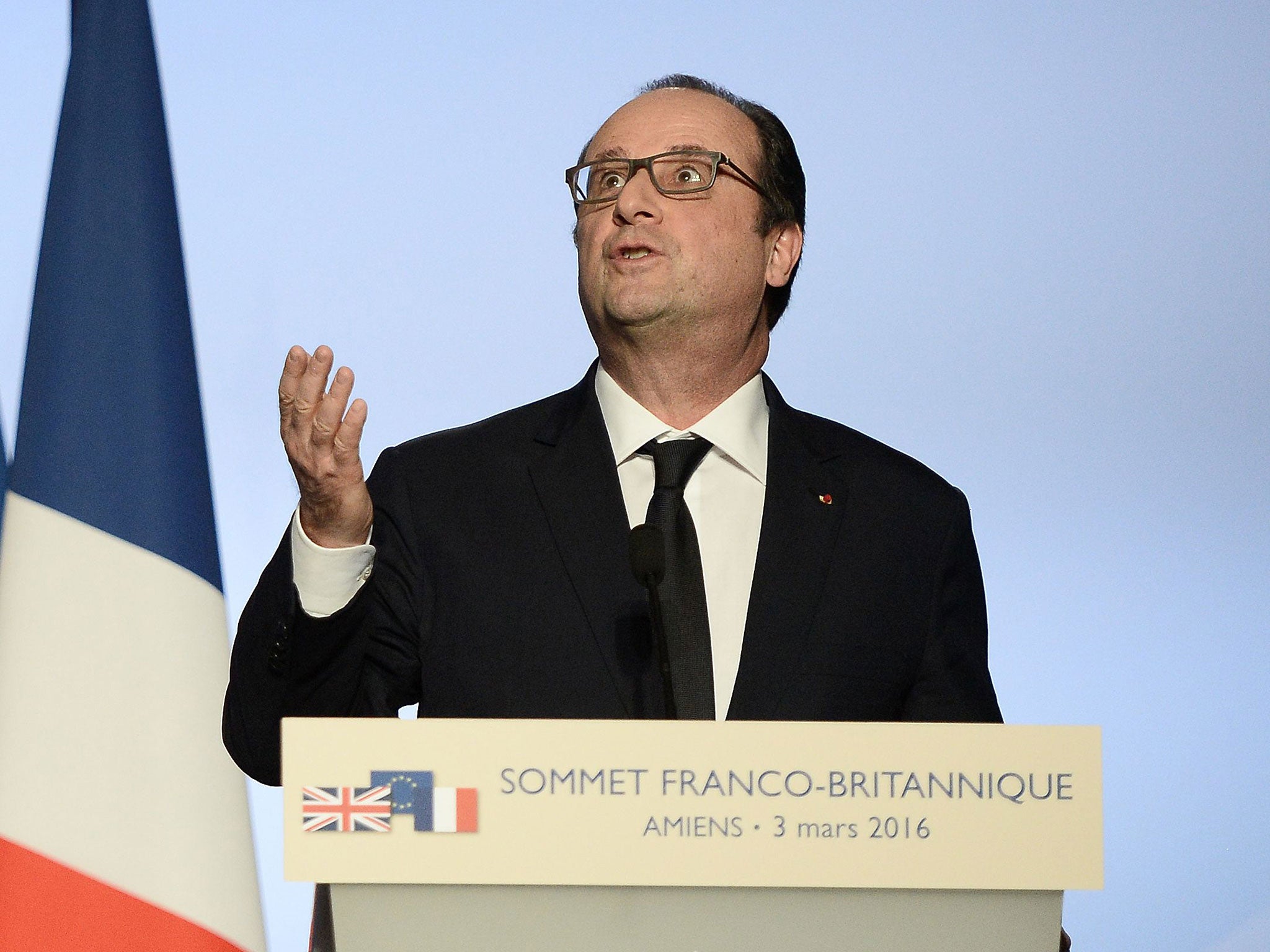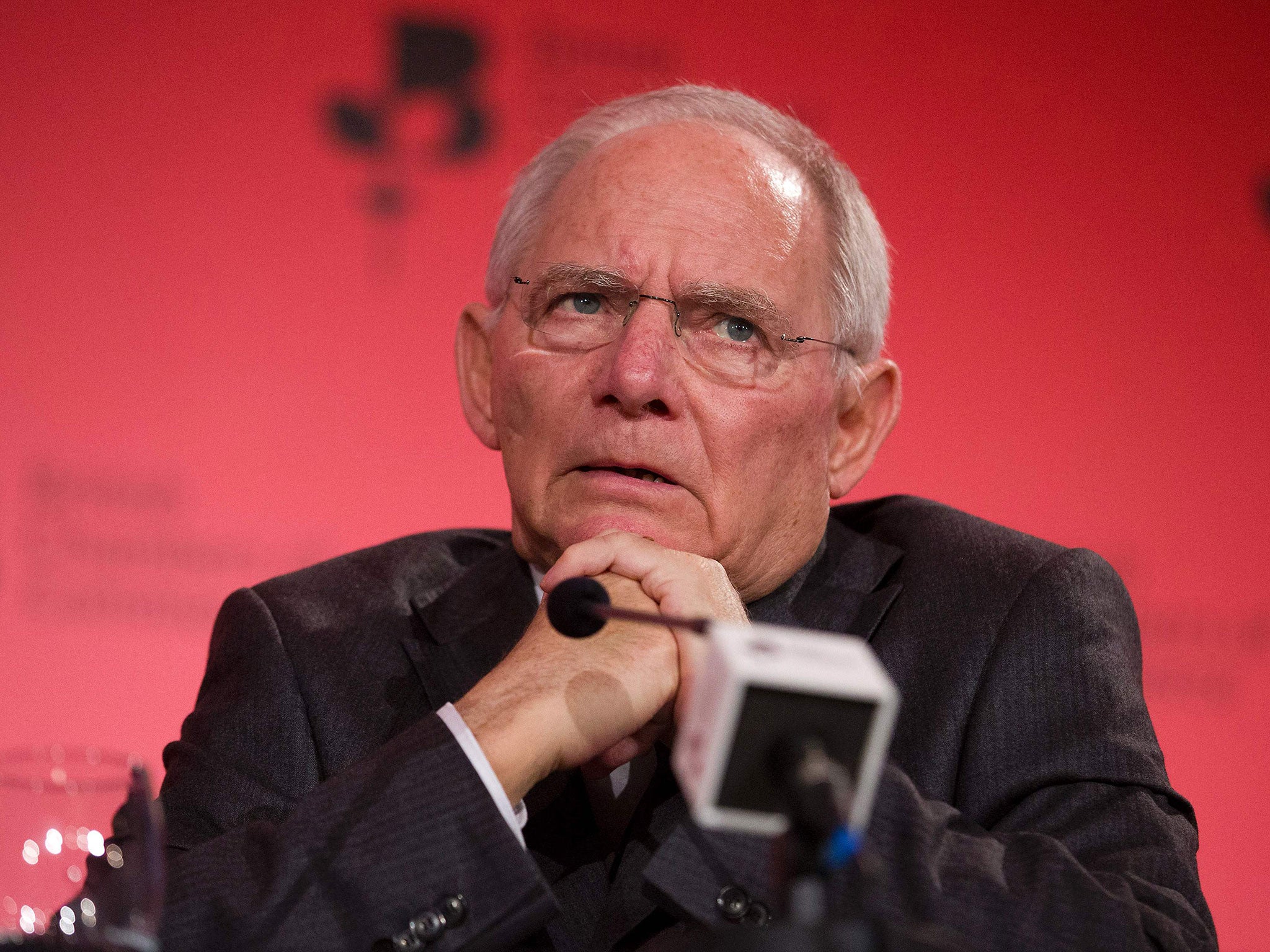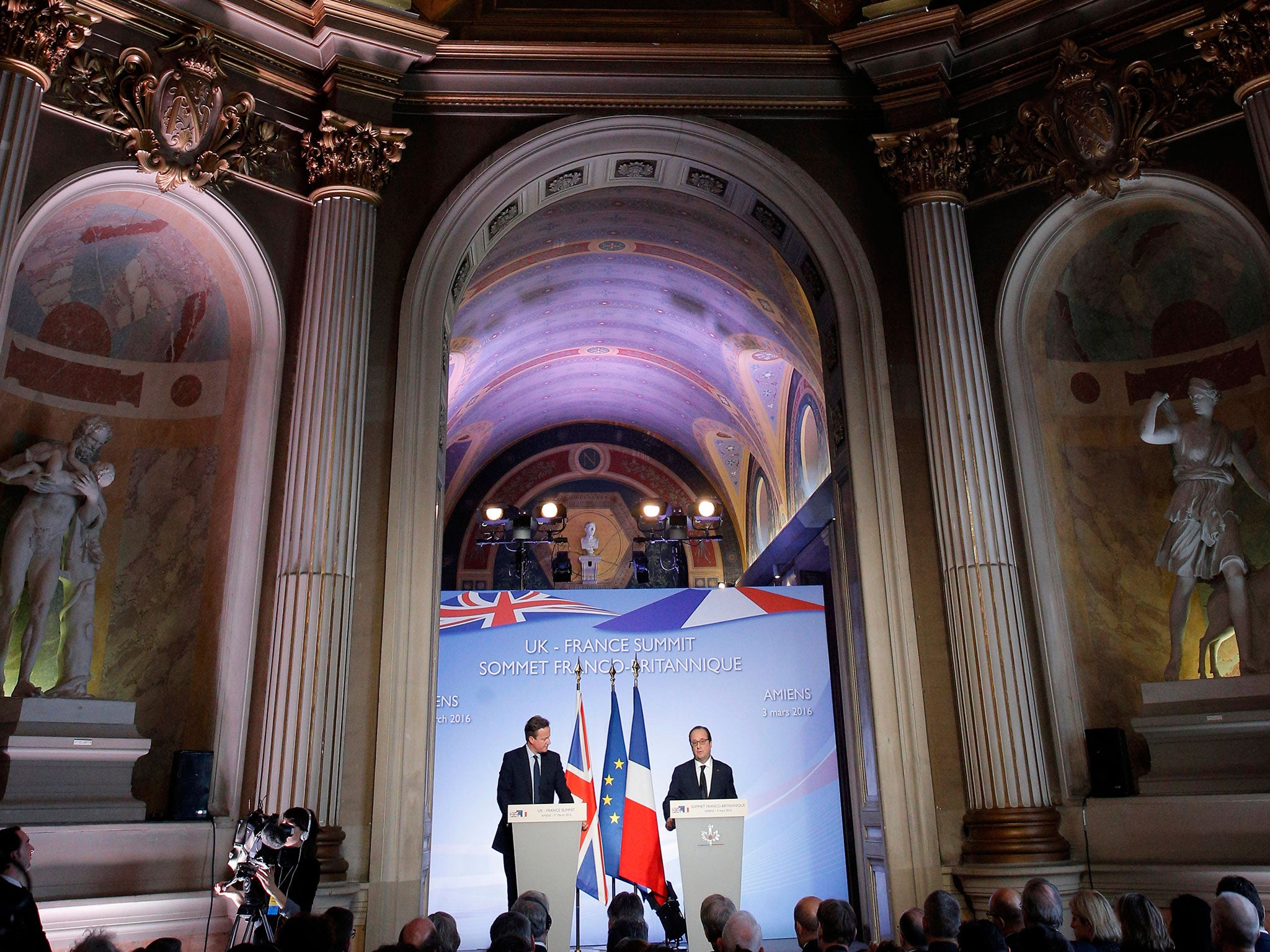EU referendum: German Finance Minister says UK would be shut out of European single market in event of a Brexit
Leave’ vote would have ‘consequences’ for Calais border deal, French President also warns

Your support helps us to tell the story
From reproductive rights to climate change to Big Tech, The Independent is on the ground when the story is developing. Whether it's investigating the financials of Elon Musk's pro-Trump PAC or producing our latest documentary, 'The A Word', which shines a light on the American women fighting for reproductive rights, we know how important it is to parse out the facts from the messaging.
At such a critical moment in US history, we need reporters on the ground. Your donation allows us to keep sending journalists to speak to both sides of the story.
The Independent is trusted by Americans across the entire political spectrum. And unlike many other quality news outlets, we choose not to lock Americans out of our reporting and analysis with paywalls. We believe quality journalism should be available to everyone, paid for by those who can afford it.
Your support makes all the difference.The two most powerful nations on the European continent have issued dark warnings about the consequences for Britain – and for Europe – if the UK votes to leave the EU.
The French President, François Hollande, said Brexit would inevitably have some impact on his country’s willingness to stop illegal migrants from crossing the English Channel. The German Finance Minister, Wolfgang Schäuble, argued that Brexit would make the whole of Europe “less stable and more volatile”, adding that Britain would be shut out of the single market if it left the EU.
Their interventions provided a boost for David Cameron, who is facing fierce opposition to his pleas for Britain to stay in the EU from nearly 130 of his MPs and the majority of Tory activists.
The gloomy French and German forecasts could sway some undecided voters, with about one-third believed to be wavering over which way to jump in the referendum on 23 June. However, Leave campaigners are convinced that comments by foreign politicians could backfire and be seen by Britons as an attempt to bully the country into line.
Chris Grayling, the Leader of the Commons, said: “The Euro establishment is desperate for Britain to stay in the EU. We spend billions of pounds each year supporting the EU, and they don’t want to lose our money.”
Mr Hollande made his remarks at the end of a Franco-British summit in the Somme region with Mr Cameron. “It is for British voters to decide. It is not for me to warn or threaten. That would probably be counter-productive,” he said. “But there will, of course, be consequences if Britain leaves the EU, including consequences for how we handle the question of immigration in Calais.”
Earlier, the French Economy Minister, Emmanuel Macron, had warned that the Jungle refugee camp in Calais could be transplanted to the Kent coast if Britain votes to leave. But Mr Macron’s remarks were dismissed by Leave campaigners as part of a “scare campaign” stage-managed by Downing Street.
Mr Schäuble, the second-most powerful politician in Germany, reflected his nation’s fears that Britain’s departure from the EU would create turmoil in the bloc. Berlin regards the UK as an important counterbalance to the countries in Southern Europe. Speaking at a British Chambers of Commerce conference in London, Mr Schäuble said: “I think the UK would take the risk that continental Europe would be less stable, more volatile.”
Asked how Germany would feel if Britain voted on 23 June to leave, he replied: “We would cry… But I hope we will not. Look, it’s a decision of the British people, of course.”
Mr Schäuble added that Britain would be able to continue having access to the single market only if it agreed to pay into the EU budget and “accept freedom of movement” of people as well as of goods and services. He said: “That will not be a reasonable position for the UK.”
Appearing alongside him, the Chancellor, George Osborne, said: “Is it the case that the national security of the UK, the security of Europe, will be helped if we were to leave the EU? I don’t think it would be the case, and my colleague here, Wolfgang Schäuble, agrees with me.”
Following the French President’s comments, Mr Cameron angrily denied any collusion with Paris to bolster the Remain campaign. He likened the suggestion to the ideas advanced by the conspiracy theorist David Icke.
“When important people abroad… when the Economics Minister of a friendly country, gives a warning, we should listen to them,” the Prime Minister said. “Of course you can say this is all some giant conspiracy… That is just nonsense.
“The best thing to do is to listen to the arguments, to listen to what people are saying, and to understand some of the risks and some of the uncertainties about leaving the European Union.”
Mr Cameron also announced that Britain was giving France another £17m – on top of £51m already spent – to cover part of the costs of security in Calais and shipping migrants to reception centres elsewhere in France.

Without being as direct as Mr Macron, Mr Hollande said the British must face up to the fact that their decision would have “consequences” for many aspects of their relationship with France and the rest of Europe. This included maintaining full access to the European single market, he said, but also the “people situation in Calais”.
He added: “It doesn’t mean everything will be destroyed, I don’t want to give you catastrophic scenarios, but there will be consequences. All democratic votes have consequences… Otherwise there would be no point in voting.”
Since 2003, a bilateral Franco-British treaty – signed at a similar summit in Le Touquet – has in effect shifted the British frontier to the French side of the Channel. British passport officers and security officials, backed by security fences and hundreds of French police, work together to try to prevent illegal migrants or asylum-seekers from reaching British soil. In an interview with the Financial Times, Mr Macron said his government wanted this treaty to continue but it would inevitably be “threatened” if Britain quit the EU. If Britain left, the “migrants will no longer be in Calais”, he warned.
French officials insisted there was no collusion with Britain. One source said Mr Macron had given the interview several days ago and was “just thinking aloud”.
Several senior French politicians from the right and left already believe that the Franco-British border should be moved back to the UK. Among them is the newly elected centre-right president of the Nord-Pas-de-Calais-Picardie region, Xavier Bertrand. After the summit on 3 March, he told The Independent: “For me, this is a treaty which has a limited life. If Britain leaves the EU, it will be time to renegotiate.”
Will Straw, the executive director of Britain Stronger In Europe, said: “The main argument of those campaigning to leave the EU lies in tatters. The people who will decide what deal we get if we leave Europe are unanimous – we cannot end free movement, end budget contributions or unilaterally ignore EU regulations without losing access to the EU’s free-trade single market. This would put jobs and low prices at risk.”

However, the Leave campaign received a fillip when John Longworth, the director-general of the British Chambers of Commerce, threw his weight behind the Brexit campaign. “With the reforms we have received so far, the UK would be better off taking a decision to leave,” he said.
He argued that the UK could create a “brighter economic future for itself” outside the EU and the long-term risks of staying in the bloc were “likely to be as daunting as the short-term risks of leaving”.
Q&A: The facts about migration post-brexit
Q | Would Brexit really mean that migrants could pour over the Channel unchecked?
A | Legally, there is no reason why this should be the case. Politically, it is likely that the UK’s departure from the EU would call into question the 2003 treaty which, in effect, moved Britain’s border to the French side of the Channel. The French Economy Minister, Emmanuel Macron, delighted the Remain camp by suggesting that Calais migrants would be allowed to reach Kent unhindered. His comments do not reflect French government policy but do reflect growing political pressure in France to scrap the present arrangement.
Q | The 2003 Treaty of Le Touquet is a French-British bilateral treaty. Why should leaving the EU matter?
A | Like any divorce, Brexit would cause bitterness on the part of the “jilted” party. Many French politicians, of both right and left, are already questioning the Calais status quo. Imagine if the situation were reversed and thousands of migrants seeking asylum in France were being blocked in Dover or Folkestone. How would British public opinion view the prospect of UK money and manpower being deployed indefinitely to “defend” France?
Q | Would the end of the Treaty of Le Touquet transfer “The Jungle” to Kent?
A | Not necessarily. If France scrapped the present British passport controls and security checks in Calais – and if the French abandoned their own controls – many more migrants and asylum-seekers would cross. But the ferry companies and Eurotunnel, and individual motorists and lorry drivers, would still face steep fines (up to £3,000 a person) for bringing unauthorised people to Kent. There would be a stream of extra migrants reaching Britain but not necessarily a flood. There would therefore be a new problem for the French. Any relaxation of the controls would attract even more migrants to Calais and other French Channel ports. The Calais Jungle and similar squatter camps might actually get bigger.
Q | Was Mr Macron put up to it by Downing Street?
A | Any collusion is strenuously denied. Mr Macron is a loose cannon. He often speaks out of turn. But he often voices unspoken truths.
John Lichfield
Join our commenting forum
Join thought-provoking conversations, follow other Independent readers and see their replies
Comments